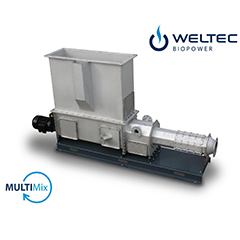WELTEC BIOPOWER, a full-service provider, has developed a rugged liquid input system which prevents outages and thus safeguards the technical stability of AD systems. Productivity is increased at the same time due to the possibility of flexibly mixing the input materials as an alternative to using expensive maize silages.
The energy potential of grass silage or whole plant silage (WPS) is very high. Frequently, bacteria are not capable, though, of completely processing carbohydrates and proteins to biogas as a result of their long, smooth surfaces. With MULTIMix, an innovation from WELTEC BIOPOWER, fibrous and sticky input materials such as grass silage, solid manure or co-substrates are comminuted, thus increasing their surface so that it is suitable for bacteria. In addition, MULTIMix separates foreign matters like rocks or metals prior to input and thus decreases the risk of the pumps and agitation systems incurring damage as well as buildup occurring in the fermenter and in the pipelines.
The operating principle is simple: the retrofittable system is installed between the dosificator and the fermenters. The substrates are taken from the dosificator and added to the MULTIMix where they are mixed with recirculate. This mashing process is supported by a screw system which roughens the fibres at the same time. Before the long-fibre substrates and lumpy materials are transported to the macerator and are effectively comminuted, an upstream process reliably separates the extraneous materials prior to being conveyed to the pump.
The decisive advantage: during input in the fermenter, the previously long-fibre substances do not only have the optimum size, but are also pre-homogenised by being mixed with the liquid. The fermenter is thus supplied with the mashed biosuspension. Robert Tholen, head of Engineering at WELTEC BIOPOWER, explains:„The biogas system of a Czech customer has been operating at a continuous full load with the aid of our MULTIMix just after a four-week start-up. Normally that takes six to eight weeks with uninoculated slurry till this level can be reached.”
As a result, MULTIMix supports biological decomposition and thus allows for a faster and greater gas yield. At the same time, it also significantly reduces the risk of floating or sinking layers developing in the fermenter. That in turn decreases the amount of agitation required and the wear and tear of the entire system. The lower vulnerability to damage results in a significant increase in the pump‘s typical service life, boosting in turn the system‘s availability.



























